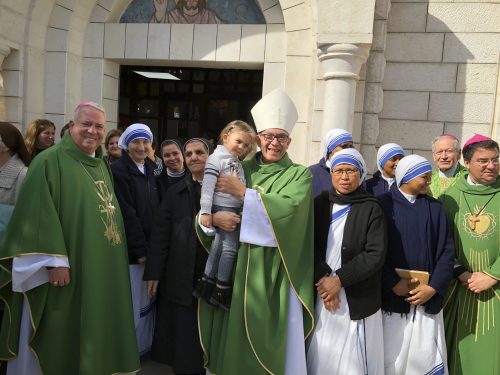By Judith Sudilovsky

JIFNA, West Bank (CNS) – Building walls, whether between Israel and the Palestinian territories or the United States and Mexico, can only serve to separate people and create more isolation, said Auxiliary Bishop Eusebio L. Elizondo of Seattle, Wash.
“Walls can’t bring any positive aspect to any country,” he said Jan. 21, during a visit to this West Bank village. “The image is very negative. ‘I am keeping you out of my life.’ … It creates more resentment and isolation. It makes it impossible to see the other.”
Bishop Elizondo was among 10 Hispanic U.S. bishops, including Brooklyn Auxiliary Bishop Octavio Cisneros, visiting the Holy Land and meeting with Israelis and Palestinians to get a better understanding of the Holy Land situation and to advocate for “bridges not walls.”
Bishop Elizondo said he had returned to the Holy Land for the first time in 30 years and had been disappointed by the feeling that the situation had gotten worse rather than better.
“It is a tragic feeling coming to the Holy Land,” a place which for centuries has not had peace, he said. “It is a long process. A very slow process. I praise and pray for people in that process, but you have to be ready for martyrdom all that time. We humans are very slow learners.”
While acknowledging that terrorist violence was one of the push factors for the creation of the Israeli separation barrier – which includes a series of 25-foot cement walls and fences and is expected to extend more than 400 miles – Auxiliary Bishop Arturo Cepeda of Detroit, Mich., said the whole use of the concept of walls prevents people from “seeing the other as a human person.”
“Gaza is like a prison,” said Bishop Cisneros. “In order to get to the other side, they have to apply for special permits that are often denied. They don’t have proper hospitals in Gaza, so sometimes they have to go out of Gaza to get medical treatment, but the process is very complicated.
“Also, they can’t import construction materials and numerous basic supplies because the Israeli authorities suspect they will be used to build weapons for terrorism.”
Father Firas Aridah, parish priest at St. Joseph Church, told visiting bishops there are more than 140 Israeli settlements and 636 Israeli checkpoints within the West Bank.
“We visited the Holy Family parish in Gaza,” explained Bishop Cisneros.
“Tradition says the Holy Family went through this place when they were fleeing to Egypt. The pastor says the community used to have more than 1,000 members, but now just 120 remain. The situation for Christians in Gaza is horrible… not just in Gaza for also in Bethlehem, Nazareth, other places.
“They are second-class citizens, they don’t have the same rights as the rest of the Israeli population, even the ones who are Israeli citizens.”
Contributing to this story was Jorge Dominguez.
